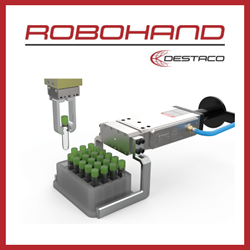Boosting SME adoption of exoskeletons in construction and manufacturing industries
A new initiative aims to accelerate the adoption of exoskeletons into construction and industrial manufacturing SMEs across Europe's North Sea Region. EXSKALLERATE, which launched in January, will over the next three years enhance SME competitiveness and occupational health by transforming the North Sea Region into a leading exoskeleton ecosystem.
A new initiative aims to accelerate the adoption of exoskeletons into construction and industrial manufacturing SMEs across Europe's North Sea Region.
EXSKALLERATE, which launched in January, will over the next three years enhance SME competitiveness and occupational health by transforming the North Sea Region into a leading exoskeleton ecosystem.
As many as 44 million workers in the European Union (EU) are affected by workplace-related musculoskeletal disorders.
Exoskeletons have the capacity to decrease the number of musculoskeletal injuries and increase quality of life at work, thereby reducing costs for a company in the long run.
Manufacturing and construction workers, in particular, undertake physically strenuous activities which increase their risk of health problems, disability and sick leave. This leads to lower job attractiveness and job candidate scarcity, resulting in unfilled job openings that slow growth and competitiveness. This is particularly true for many SMEs in the North Sea Region, who are unaware of available solutions via exoskeleton adoption as solution developers tend to target large corporates.
EXSKALLERATE aims to tackle these issues by focusing on boosting SME adoption of exoskeletons in the construction and industrial manufacturing industries, where heavy physical work leads to severe health issues. According to research conducted by the EXSKALLERATE partners, exoskeleton use could alleviate 10-40% of muscle peak loads for passive exoskeletons, and up to 80% for active.
"People have to work for longer periods in our ageing society. We strive to help people in the manufacturing and building industries to do that in a healthy and happy way by accelerating the uptake of exoskeletons. Once established in these industries, we expect that other industries, such as logistics and agriculture, will follow rapidly" says Anton Duisterwinkel, coordinator of EXSKALLERATE at InnovationQuarter.
The consortium of business support organisations, clusters, and research institutes from the UK, the Netherlands, Germany, Denmark, Belgium and Sweden, will co-design field labs according to the main SME challenges identified, where next-generation exoskeletons integrate improvements. The partners will also host several informative workshops for SMEs where exoskeleton experts will present tools to support SME decision making in exoskeleton adoption, a key challenge limiting current adoption.
EXSKALLERATE, co-funded by the Interreg North Sea Region Programme 2014 - 2020, welcomes construction and industrial manufacturing SMEs to get involved and reap the benefits of exoskeletons.
------
More information
Website: https://northsearegion.eu/exskallerate/
Twitter: https://twitter.com/exskallerate
Linkedin: https://www.linkedin.com/company/exskallerate
Contact
Amy McCready
Communications & PR Officer
Bax & Company
a.mccready@baxcompany.com
Anton Duisterwinkel
EXSKALLERATE Project coordinator
InnovationQuarter
anton.duisterwinkel@innovationquarter.nl
Featured Product

DESTACO - Revolutionizing Industrial Automation
Looking for a reliable solution to enhance your automation process? Look no further than the DESTACO Robohand Grippers. These grippers are designed for the modern world of robotics, offering unparalleled performance and precision. Whether you need to grip fragile items, irregularly shaped objects, or heavy-duty components, the DESTACO Robohand Grippers have got you covered. Their modular design allows for quick and easy customization, ensuring a perfect fit for your application.
